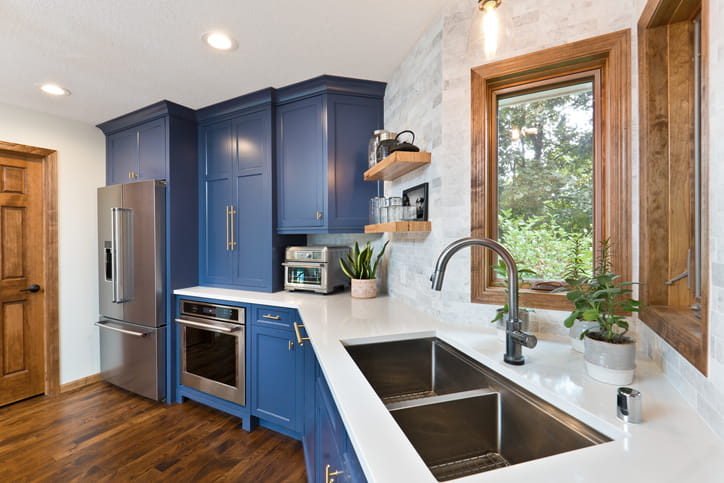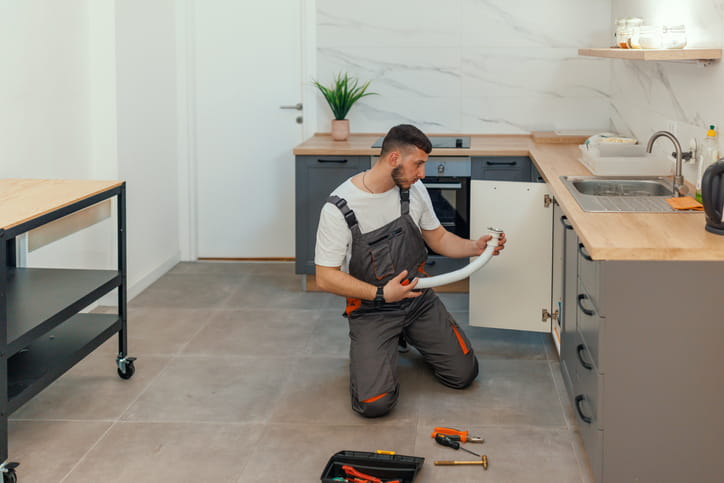Congratulations on becoming a new homeowner. As a new owner, it’s important to have a basic understanding of how the plumbing in your home works. In this residential plumbing guide, we provide an overview of plumbing basics so you can feel confident about managing your home’s plumbing needs to make informed decisions about maintenance and repairs.
Contact the Las Vegas plumbing experts at Larkin Plumbing for help with your plumbing issues
Residential plumbing guide: kitchen plumbing
- Sink: The sink is a central fixture in any kitchen, used for washing dishes, rinsing food, and other tasks
- Faucet: Familiarize yourself with the different types of faucets and their functions
- Dishwasher: If your kitchen has a dishwasher, learn how it connects to the plumbing lines under the kitchen sink
- Main water supply line: Understand where the main water supply line enters your home and how to shut off in case of emergencies or repairs
- Drain pipes: Familiarize yourself with the drain pipes that carry waste water away from the kitchen
- Garbage disposal: Know how to operate it safely, how to troubleshoot common issues, and what items you should never put in a garbage disposal
- Types of plumbing: Understand the different types of pipes used in kitchen plumbing systems, such as PVC, copper, or PEX
- Water pressure: Know when you have high or low water pressure, as it can cause problems with faucets or appliances
Residential plumbing basics: bathroom plumbing
- Sink: Familiarize yourself with the sink and its components, such as the faucet, drainpipe, and trap
- Toilet: Understand how the toilet works, including the fill valve, flush mechanism, and overflow tube. Know how to address problems like running toilets, weak flushes, or clogs.
- Shower/tub: Know how your shower head and tub spout works. Be aware of how to troubleshoot issues like low water pressure or leaks in these fixtures.
- Bathtub/shower drain: Understand how the bathtub/shower drain system works and what methods are effective for clearing clogs
- Water supply valves: Know where the water supply valves are located under toilets, sinks, tubs, and showers in case you have a plumbing emergency and need to shut off the water
Homeowner plumbing guide: sewage plumbing
- Sewer line: Know the location of the main sewer line that carries waste from your home to the municipal sewer system or septic tank
- Septic system: If your property has a septic system, learn about its components, such as tanks, drain fields, and distribution boxes, and how often it needs maintenance
- Drainage venting: Proper venting in your drainage system prevents unpleasant odors and helps maintain optimal water flow by allowing air into drains while wastewater exits. Familiarize yourself with vent pipe locations and ensure they are unobstructed.
- Backflow prevention: Learn about backflow prevention devices that protect your plumbing system from contamination by ensuring water flows only in one direction
- Cleanouts and access points: Be aware of cleanout openings, as these provide access for professional plumbers during cleaning and repairs
Residential plumbing basics: swimming pools
- Circulation system: Understand how the circulation system works, including the main components, such as the pump, filter, and skimmer
- Skimmers and drains: Know where the skimmers and drains are located in your pool
- Return jets: Identify where return jets are positioned within your swimming pool as these release treated and filtered water back into the pool
- Filtration system: Learn about the filters used with your pool plumbing system
- Valves and plumbing lines: Know the location of valves that control water flow between plumbing lines
- Winterization: Know how to winterize your pool if it does not have a heater to prevent freezing damage
Resident plumbing guide: water heaters
- Types of water heaters: Familiarize yourself with the type of water heater in your home, such as tank-type or tankless
- Location and installation: Know where your water heater is installed in your home
- Temperature settings: Know how to adjust the temperature settings on your water heater
- Maintenance tasks: Learn what routine water heater maintenance tasks are required, such as flushing sediment buildup
- Safety measures: Be aware of safety features like pressure relief valves and emergency shut-off switches that protect against excessive pressure or overheating
What plumbing things should I know about my house?
As a homeowner, it’s important to understand residential plumbing basics, such as:
- The location of water shut-off valves
- The plumbing system layout for your house
- How to identify plumbing problems with fixtures
- The types of pipe materials used in your home’s plumbing system
- How to identify water pressure and flow issues
- Know the signs of potential water leaks
- How to handle basic problems, like unclogging a drain using a plunger
Is residential plumbing complicated?
Understanding the basics of residential plumbing is not complicated and is beneficial for every homeowner. Reviewing a homeowner’s plumbing guide helps you identify potential plumbing problems early on, perform routine maintenance tasks, handle minor repairs yourself, and know when to call licensed plumbers in Las Vegas.
How much does a plumber in Las Vegas cost?
The cost of hiring a plumber in Las Vegas can vary depending on several factors, including the type and complexity of the job and the specific rates charged by different plumbers. It’s always recommended to obtain a quote to determine the actual costs.
Get affordable plumbing services in Las Vegas from Larkin Plumbing
Larkin Plumbing can meet all your plumbing needs with our affordable plumbing services in Las Vegas. With our experienced Las Vegas plumbers and competitive prices, we provide the highest quality plumbing maintenance and repair services without breaking the bank.
Contact Larkin Plumbing today to schedule plumbing services for your new home
Sources:
Stout, D. (2023). 15 Things You Should Never Put Down Your Garbage Disposal.
10 Plumbing Tips and Tricks Every Homeowner Should Know. (2022).
Williams, T. (2022). 5 Common Plumbing Problems and How to Diagnose Them.


